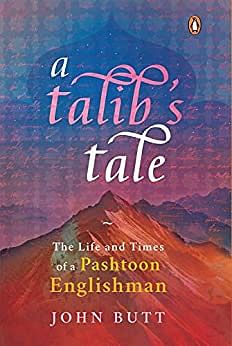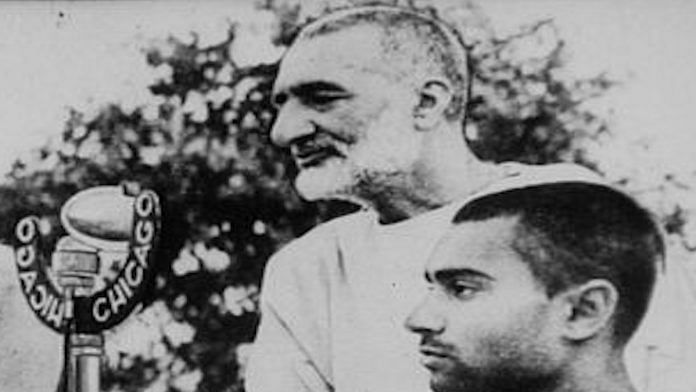There was no doubt where my sympathies lay, in the standoff between Pashtoon nationalists and Afghan jihadists in the 1980s. I was firmly in the Pashtoon nationalist camp. The person I looked up to in this regard was the greatest ‘peaceful mujahid’ anyone could imagine – the Frontier Gandhi Khan Abdul Ghaffar Khan.
Just imagine if, Nehru for instance, had not been prime minister after the freedom of India in 1947, but had been imprisoned for another few decades by the new regime that took over in India. Unimaginable, isn’t it? Well, that is exactly what happened to Khan Abdul Ghaffar Khan. And the character assassination that was aimed at Khan post-1947 was even more unrelenting than his imprisonment.
Ghaffar Khan’s daughter, the longest surviving of all his children Mehr Taj, once pointed out to me that her father was not so badly treated by the British, as he was by the Pakistan authorities. ‘The British respected Bacha Khan, but his treatment at the hands of the Pakistan authorities was even more harsh than that meted out to him by the British.’ The comparative respect Khan received from the British was due in part to the respect he accorded them, where respect was due.
Also Read: Gandhi wasn’t the only freedom leader to miss Nehru’s 1947 I-Day speech. There were others too
It was unusual for Indian freedom fighters to accord the British such respect, but Khan Abdul Ghaffar was a big-hearted freedom fighter. In his book Hind-Pak Diary, Maulana Wahiduddin Khan – himself a Gandhian figure among Pashtoons of South Asia – recounts the tale of an Englishman by the name of Mr Larry, who lived near their village in Azamgarh district of U.P. He ran a farm in the hamlet of Baseenpur. The nearest railway station to Baseenpur was Shah Ganj. In order to reach this railway station, Mr Larry used to pass by Maulana’s house on horseback. Maulana’s family being freedom fighters and anti-British, they disliked the fact that an Englishman was passing by their homestead. They asked him to take another route to the railway station. Mr Larry did not pay any attention.
One day, while Mr Larry was on his way to the railway station, Maulana’s family stopped him and forced him off his horse. In contravention of Gandhian principles of non-violence, they gave Mr Larry a good beating. Presumably, Mr Larry could have had lodged a complaint with the government, but he did not do so. Instead of taking any retaliatory measures, Mr Larry just changed his route to the railway station, opting for a longer route. He did this to avoid any confrontation, and pre-empt any untoward incident. At the time, Maulana was a young man. He admits that he felt a sense of pride that his family appeared to have got the better of an Englishman. Now, with the benefit of hindsight, Maulana wonders why, instead of confronting Mr Larry, they had not sought to benefit from him, from the advanced agricultural methods that he practised, not to mention from his self-effacing, even Gandhian, reaction to the violent attack.
Hatred of the British, Maulana suggests, prevented people from benefiting from them. ‘Unfortunately,’ he writes, ‘just about every major movement launched in the sub-continent over the last 100 years has been based on hatred.’ In fact, Maulana could have made an exception in the case of the great Pashtoon leader, Khan Abdul Ghaffar Khan’s Khudai Khidmatgars.
Also Read: Petty, bad tempered Kasturba — What Gandhi said while courting Sarladevi & Esther Faering
In terms of Pashtoon leadership in the 20th century, Ghaffar Khan was a colossus. The Khudai Khidmatgars that he founded were attached to Congress. They were as intent on Indian independence, and I suppose one could say anti-British, as anyone. Yet surprisingly enough, on his own admission, it was an Englishman who inspired Khan Abdul Ghaffar Khan to dedicate his life to the service of the Pashtoon people. Anti-Britishness did not prevent Khan from taking the good and leaving the bad as far as the British were concerned. The inspirational figure in Khan’s life was Mr Wigram, his teacher at the Mission School, Peshawar.
The young Ghaffar Khan was extremely impressed by Mr Wigram, and his brother Dr Wigram. Both of them had dedicated their lives to service of the Pashtoon people. The fact that the Wigram brothers were of English origin made Ghaffar Khan look up to them even more. Look at how they have come from another country, another nation, another religion, the young Abdul Ghaffar thought, yet they have devoted their lives to the service of Pashtoon children. Abdul Ghaffar Khan was particularly impressed at how Wigram Sahib used to donate his salary for the upkeep of poor Pashtoon children, who otherwise would not have been able to study at Mission School. ‘It was he who moved me to serve my people,’ Khan recalled in his book Zama Jhwand au Jadd-o-Jahd – My Life and Struggle.
If one is surprised at the source of Ghaffar Khan’s inspiration being an Englishman, the source of me becoming familiar with the life, sacrifice and struggle of Khan Abdul Ghaffar Khan was no less surprising. Sardar Abdul Rashid had been a member of the Pakistan Muslim League, responsible for the formation of Pakistan and direly opposed to Bacha Khan’s Khudai Khidmatgars. As head of his own Khudai Khidmatgar party, dedicated to ‘serving others for the sake of God’, Ghaffar Khan had been loyally attached to the Congress Party of Mahatma Gandhi and Jawaharlal Nehru.
Also Read: The Pashtun movement is not burning buses or seeking separation — it is a fight for dignity
One factor that softened Sardar Sahib’s attitude to Bacha Khan was the friendship between Sardar Sahib and Bacha Khan’s son-in-law, Yahya Jan. The latter had served as Education Minister in the Government of the North-West Frontier Province prior to Partition in 1947. Also, as a key member of the Muslim League, Sardar Sahib had been witness to the excesses of the Muslim League against Bacha Khan. He had seen how Bacha Khan had campaigned all his life and rendered sacrifices more than any other person, in order to raise awareness among the Pashtoon people, making them in the process fit for independence from the British. Then, when Pakistan was formed, instead of his struggle and sacrifices being acknowledged, he was made to suffer even more.
Sardar Sahib was fond of telling a tale. On the formation of Pakistan, many erstwhile members of the Khudai Khidmatgars joined the Pakistan Muslim League. Mian Jafar Shah Kaka Khel is one name that springs to mind in this regard. When they were challenged on this, one of them, Arbab Abdur Rahman of Nagoman, near Charsadda, said they were like watermelons, ‘green on the outside and red inside’, green being the colour of the Muslim League, red the colour of the Khudai Khidmatgars. Among this number – ‘green on the outside, red inside’ – Sardar Sahib could also have counted himself. Indeed, the British knew the Khudai Khidmatgars more as ‘Red Shirts’ than by their real name.
Nowadays, the Bollywood star Shah Rukh Khan is known as King Khan. In his day, Ghaffar Khan was the King Khan – Bacha Khan – of his age. He received the name Bacha Khan after he began his life’s mission. He always stresses that his was a social movement, not a political one. Early on in his career, when he held a meeting aimed at rooting out social ills in his native village of Utmanzai, he had pointed out that there should be chairman of the meeting. The villagers suggested that he himself should be chairman of the meeting. When Khan acquiesced, the simple and uninitiated villagers gave him the name Bacha Khan – King Khan – not seeing the difference between the chairman of a meeting and a king. Khan Abdul Ghaffar Khan, they thought, must have been crowned king, since he had become chairman of a meeting.

This excerpt from A Talib’s Tale: The Life and Times of a Pashtoon Englishman by John Butt has been published with permission from Penguin India.




We should not believe Pakistani. One shouldn’t believe an Islamic state which follows inexorable logic of its Islamic premises. While their life was pregnant with all manners of corruption and Sin , smallest of which surely lead to hell. Islamist want to create Mujahideen , it has no intention of making revellers, Islam grew grew with blood. The great prophet of Islam on one hand carried the Koran and in the other a sword.
I take it ,u are judging the prophet of islam ,through the eyes of hatred u have for muslims.Like all religion s,there are people, who have no knowledge of there own religion. Yet they have committed evil in its name.Try reading the prophets biography, written by people, with clear minds,,and see wat they say.The hate u have is due to wat moguls did,many of them did wat islam prohibited. Judge humanity for wat it is.Who would u blame the killing of innocent in india.The muslims of India, decided in 1947,they are Indians,so they stayed. 72 years latter they are still proving their loyalty. The very reason (rightly or wrongly) the nation was cut.Lot people of ignorance are blaming the religion of Islam for crimes committed by ignorant, who takes the blame of murder s of innocent muslims by hindus.I have never read the hindu scriptures, but am sure they dont preach murders.!